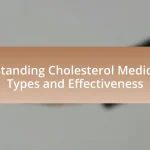The article focuses on dietary considerations for individuals taking cholesterol-lowering drugs, emphasizing the importance of limiting saturated fats, trans fats, and cholesterol while increasing soluble fiber and omega-3 fatty acids. It discusses how dietary choices can significantly impact the effectiveness of medications like statins, highlighting specific foods to avoid and those that can enhance drug efficacy. Additionally, the article addresses the role of fiber and plant sterols in cholesterol management, the importance of lifestyle changes, and common misconceptions about diet and cholesterol medications. Practical tips for managing diet while on these medications are also provided, ensuring a comprehensive understanding of how nutrition influences cholesterol levels and overall heart health.

What are Dietary Considerations When Taking Cholesterol-Lowering Drugs?
Dietary considerations when taking cholesterol-lowering drugs include limiting saturated fats, trans fats, and cholesterol intake while increasing soluble fiber and omega-3 fatty acids. Research indicates that diets low in saturated fats can significantly enhance the effectiveness of statins, a common class of cholesterol-lowering medications. For instance, the American Heart Association recommends consuming less than 7% of total daily calories from saturated fat to improve lipid profiles. Additionally, foods rich in soluble fiber, such as oats and beans, can help lower LDL cholesterol levels, while omega-3 fatty acids found in fish can provide cardiovascular benefits.
How do dietary choices impact the effectiveness of cholesterol-lowering drugs?
Dietary choices significantly impact the effectiveness of cholesterol-lowering drugs by influencing lipid metabolism and drug absorption. For instance, a diet high in saturated fats can counteract the effects of statins, a common class of cholesterol-lowering medications, by increasing LDL cholesterol levels. Conversely, diets rich in soluble fiber, such as oats and legumes, can enhance the efficacy of these drugs by further lowering cholesterol absorption in the intestines. Research published in the Journal of Clinical Lipidology indicates that patients adhering to a Mediterranean diet, which emphasizes healthy fats and whole grains, experience improved outcomes with statin therapy compared to those with a standard Western diet.
What specific foods should be avoided while on cholesterol-lowering medications?
While on cholesterol-lowering medications, individuals should avoid foods high in saturated fats, trans fats, and cholesterol. Saturated fats are commonly found in red meat, full-fat dairy products, and certain oils like coconut and palm oil. Trans fats, often present in processed foods, fried items, and baked goods, can raise LDL cholesterol levels. Foods high in cholesterol, such as organ meats, shellfish, and egg yolks, should also be limited. Research indicates that reducing these types of fats and cholesterol can enhance the effectiveness of cholesterol-lowering medications, leading to better overall heart health outcomes.
Which foods can enhance the effectiveness of these medications?
Foods that can enhance the effectiveness of cholesterol-lowering medications include those high in soluble fiber, such as oats, barley, beans, lentils, fruits, and vegetables. Soluble fiber helps reduce cholesterol absorption in the bloodstream, thereby improving the efficacy of statins and other cholesterol-lowering drugs. For instance, a study published in the American Journal of Clinical Nutrition found that a diet rich in soluble fiber can lower LDL cholesterol levels significantly, which complements the action of these medications.
Why is it important to monitor dietary fat intake?
Monitoring dietary fat intake is crucial for managing cholesterol levels and overall heart health. High intake of saturated and trans fats can elevate low-density lipoprotein (LDL) cholesterol, increasing the risk of cardiovascular diseases. Research indicates that reducing saturated fat intake by 5-10% can lower LDL cholesterol by approximately 10%. This relationship underscores the importance of dietary fat monitoring, particularly for individuals on cholesterol-lowering medications, as it can enhance the effectiveness of these treatments and promote better health outcomes.
What types of fats should be limited or avoided?
Saturated fats and trans fats should be limited or avoided. Saturated fats, commonly found in red meat, full-fat dairy products, and certain oils like coconut and palm oil, can raise LDL cholesterol levels, increasing the risk of heart disease. Trans fats, often present in partially hydrogenated oils used in processed foods, not only raise LDL cholesterol but also lower HDL cholesterol, further contributing to cardiovascular risk. The American Heart Association recommends that saturated fat intake be limited to less than 6% of total daily calories, and trans fats should be avoided as much as possible to maintain heart health.
How can healthy fats be incorporated into the diet?
Healthy fats can be incorporated into the diet by including sources such as avocados, nuts, seeds, olive oil, and fatty fish like salmon. These foods provide essential fatty acids and can help improve cholesterol levels. Research indicates that diets rich in monounsaturated and polyunsaturated fats can lower LDL cholesterol and reduce the risk of heart disease, making them beneficial for individuals taking cholesterol-lowering drugs. For example, a study published in the American Journal of Clinical Nutrition found that replacing saturated fats with unsaturated fats significantly improved lipid profiles in participants.
What role do fiber and plant sterols play in cholesterol management?
Fiber and plant sterols play a significant role in cholesterol management by reducing LDL cholesterol levels. Soluble fiber, found in foods like oats and beans, binds to cholesterol in the digestive system, preventing its absorption into the bloodstream. Studies indicate that a daily intake of 5 to 10 grams of soluble fiber can lower LDL cholesterol by 5% to 10%. Plant sterols, which are found in fortified foods and supplements, compete with cholesterol for absorption in the intestines, leading to a reduction in cholesterol levels. Research shows that consuming 2 grams of plant sterols daily can lower LDL cholesterol by about 5% to 15%. Together, these dietary components contribute to effective cholesterol management, particularly for individuals taking cholesterol-lowering medications.
How much fiber is recommended for individuals taking cholesterol-lowering drugs?
Individuals taking cholesterol-lowering drugs are generally recommended to consume 25 to 30 grams of dietary fiber per day. This recommendation is based on evidence that dietary fiber, particularly soluble fiber, can help lower cholesterol levels. Studies indicate that soluble fiber can reduce low-density lipoprotein (LDL) cholesterol, which is often referred to as “bad” cholesterol, thereby enhancing the effectiveness of cholesterol-lowering medications.
What are the best sources of plant sterols?
The best sources of plant sterols include vegetable oils, nuts, seeds, whole grains, and fortified foods. Specifically, oils such as corn oil, soybean oil, and canola oil are rich in plant sterols, while nuts like almonds and walnuts, as well as seeds such as sunflower seeds, provide significant amounts. Whole grains, particularly oats and barley, also contribute to plant sterol intake. Additionally, many food products, including margarine and yogurt, are fortified with plant sterols to enhance their cholesterol-lowering effects. Research indicates that consuming 2 grams of plant sterols daily can help reduce LDL cholesterol levels, supporting their role in heart health.

How can lifestyle changes complement cholesterol-lowering medications?
Lifestyle changes can significantly enhance the effectiveness of cholesterol-lowering medications by improving overall heart health and reducing cholesterol levels further. For instance, adopting a diet rich in fruits, vegetables, whole grains, and healthy fats can lower LDL cholesterol, which complements the action of statins and other medications. Research indicates that dietary modifications can lead to a 5-10% reduction in LDL cholesterol, which, when combined with medication, can result in a more substantial decrease in cardiovascular risk. Additionally, regular physical activity can improve lipid profiles and support weight management, further aiding the cholesterol-lowering effects of prescribed drugs.
What lifestyle modifications can improve cholesterol levels?
To improve cholesterol levels, individuals should adopt a heart-healthy lifestyle that includes regular physical activity, a balanced diet low in saturated fats and trans fats, and maintaining a healthy weight. Engaging in at least 150 minutes of moderate aerobic exercise weekly can significantly lower LDL cholesterol and raise HDL cholesterol. Consuming foods rich in omega-3 fatty acids, such as fatty fish, and increasing fiber intake through fruits, vegetables, and whole grains can also contribute to better cholesterol management. Studies show that these lifestyle changes can lead to a reduction in total cholesterol levels by 10-15% over time, demonstrating their effectiveness in promoting cardiovascular health.
How does regular exercise influence cholesterol levels?
Regular exercise positively influences cholesterol levels by increasing high-density lipoprotein (HDL) cholesterol and lowering low-density lipoprotein (LDL) cholesterol. Engaging in physical activity helps improve the body’s ability to metabolize fats and enhances the efficiency of the cardiovascular system. Studies indicate that moderate-intensity aerobic exercise, such as brisk walking or cycling, can raise HDL levels by 5% to 10% and lower LDL levels significantly, contributing to overall heart health.
What are the benefits of maintaining a healthy weight?
Maintaining a healthy weight significantly reduces the risk of chronic diseases. Individuals with a healthy weight experience lower rates of heart disease, diabetes, and certain cancers. According to the Centers for Disease Control and Prevention, maintaining a healthy weight can improve cholesterol levels, blood pressure, and blood sugar levels, which are critical factors in managing overall health and particularly important for those taking cholesterol-lowering drugs. Furthermore, a healthy weight enhances mobility and physical function, contributing to a better quality of life.
How does alcohol consumption affect cholesterol-lowering drug efficacy?
Alcohol consumption can reduce the efficacy of cholesterol-lowering drugs, particularly statins. Studies indicate that excessive alcohol intake can lead to liver damage, which impairs the metabolism of these medications, thereby decreasing their effectiveness in lowering cholesterol levels. For instance, research published in the Journal of Clinical Lipidology found that patients consuming more than two alcoholic drinks per day experienced a significant reduction in the effectiveness of statins, leading to less optimal cholesterol management.
What are the recommended limits for alcohol intake?
The recommended limits for alcohol intake are up to one drink per day for women and up to two drinks per day for men. These guidelines are established by health organizations such as the Centers for Disease Control and Prevention (CDC) and the Dietary Guidelines for Americans, which emphasize moderation to reduce health risks. Excessive alcohol consumption can interfere with the effectiveness of cholesterol-lowering medications and increase the risk of adverse effects.
How can alcohol interact with cholesterol-lowering medications?
Alcohol can interact with cholesterol-lowering medications by potentially increasing the risk of side effects and reducing the effectiveness of the drugs. For instance, certain statins, a common class of cholesterol-lowering medications, can lead to liver damage when combined with excessive alcohol consumption. Research indicates that heavy drinking can elevate liver enzymes, which may indicate liver injury, thus complicating the treatment of high cholesterol. Additionally, alcohol can affect the metabolism of these medications, leading to altered drug levels in the body, which may diminish their cholesterol-lowering effects.

What are common misconceptions about diet and cholesterol-lowering drugs?
Common misconceptions about diet and cholesterol-lowering drugs include the belief that dietary changes alone can replace medication and that all cholesterol is harmful. Many individuals think that by simply avoiding dietary cholesterol, they can effectively manage their cholesterol levels without medication. However, research indicates that saturated and trans fats in the diet have a more significant impact on blood cholesterol levels than dietary cholesterol itself. Additionally, some people mistakenly believe that cholesterol-lowering drugs, such as statins, allow them to eat unhealthy foods without consequence. In reality, while these medications can help lower cholesterol, they are most effective when combined with a heart-healthy diet.
What myths exist regarding cholesterol and dietary cholesterol intake?
Myths regarding cholesterol and dietary cholesterol intake include the belief that all cholesterol is harmful and that dietary cholesterol directly raises blood cholesterol levels. Research indicates that while high levels of low-density lipoprotein (LDL) cholesterol are associated with cardiovascular disease, not all cholesterol is detrimental; high-density lipoprotein (HDL) cholesterol is protective. Additionally, studies, such as those published in the American Journal of Clinical Nutrition, show that dietary cholesterol has a minimal impact on blood cholesterol levels for most individuals, as the body regulates its cholesterol production.
How does dietary cholesterol affect blood cholesterol levels?
Dietary cholesterol has a minimal effect on blood cholesterol levels for most individuals. Research indicates that for the majority of people, the body regulates cholesterol production in response to dietary intake, meaning that increased consumption of dietary cholesterol does not significantly raise blood cholesterol levels. A study published in the American Journal of Clinical Nutrition found that only about 25% of the population, known as “hyper-responders,” may experience a notable increase in blood cholesterol levels when consuming high amounts of dietary cholesterol. This regulation mechanism is influenced by factors such as genetics, overall diet, and lifestyle.
What is the truth about saturated fats and heart health?
Saturated fats have been linked to increased levels of LDL cholesterol, which is associated with a higher risk of heart disease. Research indicates that diets high in saturated fats can lead to elevated cholesterol levels, potentially contributing to cardiovascular issues. For instance, a meta-analysis published in the American Journal of Clinical Nutrition found that replacing saturated fats with unsaturated fats can lower the risk of heart disease. Therefore, moderating saturated fat intake is generally recommended for maintaining heart health, especially for individuals concerned about cholesterol levels while taking cholesterol-lowering medications.
What should patients discuss with their healthcare providers regarding diet?
Patients should discuss their dietary habits and specific food choices with their healthcare providers when taking cholesterol-lowering drugs. This conversation should include the types of fats consumed, such as saturated and trans fats, which can impact cholesterol levels. Additionally, patients should inquire about the role of fiber-rich foods, such as fruits, vegetables, and whole grains, in managing cholesterol. Research indicates that a diet low in saturated fats and high in soluble fiber can significantly lower LDL cholesterol levels, supporting the effectiveness of cholesterol-lowering medications. Furthermore, patients should address any dietary supplements or herbal products they are considering, as these can interact with their medications.
How can patients effectively communicate their dietary habits to their doctors?
Patients can effectively communicate their dietary habits to their doctors by maintaining a detailed food diary that tracks daily intake, including portion sizes and meal timings. This method allows healthcare providers to assess dietary patterns and identify any potential impacts on cholesterol levels. Studies show that patients who provide comprehensive dietary information enable doctors to tailor cholesterol-lowering treatments more effectively, as personalized dietary advice can significantly enhance medication efficacy.
What questions should patients ask about their diet and medications?
Patients should ask their healthcare providers specific questions about their diet and medications to ensure safe and effective treatment. Key questions include: “Are there any foods I should avoid while taking my cholesterol-lowering medication?” This is crucial because certain foods, like grapefruit, can interact negatively with some cholesterol medications, leading to increased side effects. Another important question is, “How should I adjust my diet to enhance the effectiveness of my medication?” This inquiry is vital as a heart-healthy diet rich in fruits, vegetables, and whole grains can complement the effects of cholesterol-lowering drugs. Additionally, patients should ask, “Are there any dietary supplements I should be cautious about while on this medication?” This is essential since some supplements may interfere with medication efficacy or increase the risk of side effects.
What practical tips can help manage diet while on cholesterol-lowering drugs?
To manage diet while on cholesterol-lowering drugs, individuals should focus on incorporating heart-healthy foods, such as fruits, vegetables, whole grains, and lean proteins, while reducing saturated fats and trans fats. Research indicates that a diet rich in soluble fiber, found in oats and legumes, can help lower cholesterol levels effectively. Additionally, consuming fatty fish, which are high in omega-3 fatty acids, can further support heart health. Limiting processed foods and added sugars is also crucial, as these can contribute to weight gain and negatively impact cholesterol levels.










